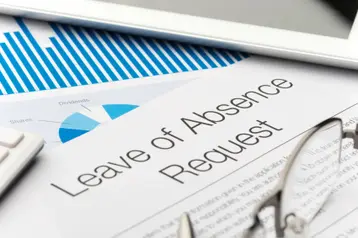
Table of contents
- 1.What is a leave of absence request?
- 2.Common reasons why people put in a leave of absence request
- 3.What to include in a leave request
- 4.Reason for leave of absence
- 5.How much time you’ll need
- 6.Offer a work plan
- 7.Respect and appreciation
- 8.Leave of absence request email example
- 9.Being proactive is the best approach
Every year, millions of people take some sort of leave from work. According to the U.S. Bureau of Labor Statistics¹, in January 2022 alone, nearly 8 million workers missed work due to illness, injury, medical issues, or appointments. In comparison, the number was about half that a year earlier. These figures don’t account for other reasons why people may need to take off work for extended periods of time. Health and medical leave is a common form of employee leave. And so are maternity and paternity leave, personal leave, and time away for civic, military, and family reasons. At some point in your career, you may need to take an unexpected leave of absence from your job. In such an event, it’s a good idea to already be familiar with how to write a leave of absence letter. It's also wise to know the company policy about what qualifies for an unpaid vs. paid leave of absence, job-protected leave, and eligible employees before making a request. Understanding company policies can help you plan better and avoid a potentially adverse outcome resulting from assumptions or misunderstandings. In this article, we’ll discuss what constitutes a leave of absence, why you might need one, and how to write your letter.
What is a leave of absence request?
A good percentage of employers offer their employees paid time off (PTO) and vacation time. Some may structure it in categories for specific intentions (e.g., sick days, personal days, vacation time). Others may offer a predetermined amount of time for use however employees please, whether for medical leave or other reasons. A leave of absence is a situation in which an employee asks and receives permission from their employer to take an extended amount of time off from their job. In such a situation, this is a little different than paid leave benefits. While it can apply to various types of leave, a leave of absence is typically reserved for circumstances that are unique and when the amount of paid leave days is insufficient.
Common reasons why people put in a leave of absence request
As an employee, you may find yourself in one of the following situations and want to submit a formal leave of absence letter requesting extended time off:
- Sick leave, including prolonged health issues and other medical reasons.
- Mental health, sabbatical, extended vacation, or other personal reasons.
- Caring for family members.
- Military leave, jury duty, or civic obligations.
- Bereavement.
- Finishing education.
Maternity and paternity leave are also common requests. This isn’t a comprehensive list. But does represent events for which you might make a leave request official in the form of a formal letter.
What to include in a leave request
When you ask for a leave from work, your employer will need specific information for decision-making and operational purposes. Here's what to include in your formal request.Reason for leave of absence
Outline to your employer why you’ll need to take extended leave. Keep in mind, certain types of leave requests are mandated by law to be approved by employers. These include for purposes involving the Family and Medical Leave Act (FMLA), Emergency Family and Medical Leave Act (EFMLA), Americans with Disabilities Act (ADA), jury duty, and military service. For other, more personal reasons, you may be a little more general, leaving small, private details out.
How much time you’ll need
Outline to your employer how much time you expect to be gone from your job. This will help them plan for continuity during your absence. Remember to add a start date
and return date. If you aren’t sure about the latter due to extenuating circumstances, provide an estimated date.
Offer a work plan
Depending on the nature of your job, it may be difficult for your employer to fill your shoes in your absence. To help facilitate your absence, it’s a nice gesture to offer help.
- Provide contact information for critical questions.
- Train a replacement (time permitting).
- Create a detailed employee handbook or SOP for an easier transition.
This is not required to include in your letter. But if it's feasible per your circumstances, your employer will appreciate any efforts to help.
Respect and appreciation
Lastly, end your leave of absence request letter with a polite thank you to show your employer or HR team appreciation for their support.
Leave of absence request email example
If you’re having trouble constructing your formal letter, you can access a number of free leave of absence letter templates online. However you compose yours, here is an example of the general structure you'll need to build on:
Subject: Leave of Absence –
Dear ____,
Due to _____, I am requesting a formal leave of absence so I can tend to this matter. I plan to be away starting and intend to return. If my request is approved, upon your request I will be happy to help facilitate a plan to cover my responsibilities in my absence. I can be reached at to answer questions or provide other assistance.
Please let me know if you need additional information. Thank you very much for your understanding and consideration of my request for leave.
Sincerely,
Being proactive is the best approach
If you find you need to take extended leave, it’s best to be proactive in your approach. Give your employer as much advance notice as possible. Support the company to the best of your ability as they support you. To learn more about leave requests, the HR and employee experience, and other career-related topics, visit TriNet.
1 7.8 Million Workers Had an Illness-Related Work Absence in January 2022, U.S. Bureau of Labor Statistics

TriNet Team
Table of contents
- 1.What is a leave of absence request?
- 2.Common reasons why people put in a leave of absence request
- 3.What to include in a leave request
- 4.Reason for leave of absence
- 5.How much time you’ll need
- 6.Offer a work plan
- 7.Respect and appreciation
- 8.Leave of absence request email example
- 9.Being proactive is the best approach





